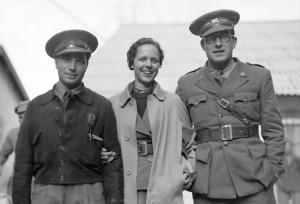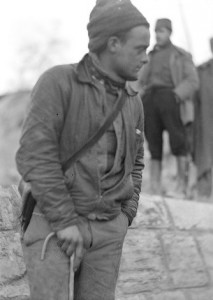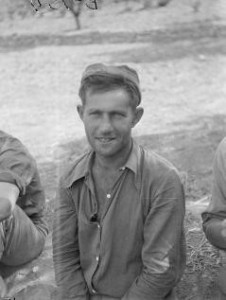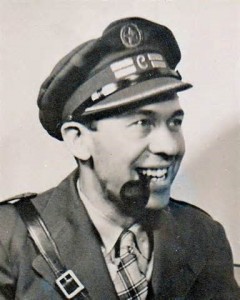Commissars I’ve Known (and Admired) – by Milt Wolff
Editor’s note: At the initiative of ALBA board member Chris Brooks, who maintains the online biographical database of US volunteers in Spain, in 2015 the ALBA blog regularly posted interesting articles from historical issues of The Volunteer, annotated by Chris.Over the next three months, Blast from the Past postings showcased articles about the American volunteers who served in the Artillery. Many of these articles ran in The Volunteer during Ben Iceland’s tenure as editor. Iceland, who served in the Artillery, recruited several of his fellow artillerymen to document their experiences. Iceland also shared his own experiences in a series of articles he originally wrote in the early 1940s. Together these articles shine a light on some lesser known American volunteers. We now extend the series by posting some additional articles which were not included in the original series, though they are fascinating in their own right.
Commissars I’ve Known (and Admired)
by Milt Wolff
[Originally published in The Volunteer, Volume 7, No. 3, November 1985.]
I was moved, (perhaps provoked would be the better word) to write this piece after having read Ed Lending’s little story in the last issue of The Volunteer [“Los Rompedores” was re-run as a Blast From the Past on August 25, 2015]. The tale, to refresh your memory, has to do with the trials and travails of an anti-aircraft battery, in particular, the disaster that befell the unit when a shell exploded killing members of the crew, and of the eulogies that followed the tragedy. The punch-line of the story, and the reason for its being told at all, comes as some unnamed commissar who in the midst of delivering “…dusty, overworked bromides” places the blame for the accident on “…those perfidious Trotskyites…”. We are left with the impression that the commissar had thus, with a few word, caused a profound change for the worse in the way the author viewed this commissar and possibly the institution of commissars in toto.
Commissars have not fared very well in many of the vignettes submitted by our comrades for publication in The Volunteer. On the other hand, I do not recall seeing any contravening commentaries or stories by our surviving commissars; I hope they will be forthcoming. Meanwhile, I am asking readers of this much-praised periodical to join me in a ramble through the ranks of commissars we have known. What follows is how I recall the men in context of the time, place and prevailing conditions.
The first commissar to impinge on my consciousness was Steve Nelson. Having missed Jarama, an unforgivable sin of omission, it was only by hearsay that I learned of his outstanding performance on that front. The Washingtons were in training camp in Madrigueras, later in Tarazona, when the Lincolns were in the trenches at Jarama. One way or another word of what was doing at Jarama reached us, and the reports of Steve’s effectiveness and popularity with men there made the rounds.
I cannot recall the name(s) of any commissar at the training base, nor can I recall the name of either the battalion or MG Company commissars at the battle of Brunete. Perhaps this lapse on my part had to do with my being overly concerned with learning to be as good a machine-gunner as I possibly could be. When the Lincolns and Washingtons merged, some time midway through the Brunete action, I was delighted to learn that Steve was now my commissar. However, as a soldado [soldier] pre-occupied with the business of fighting the fascists, I seemed not to have been otherwise affected by this development.
After 20 or 21 days of the Brunete action, the Americans, what was left of them, were relieved by other units. Then word came down that the front we had left was not holding. Steve made a speech urging upon us the necessity to return to the front. This was the first time I saw Steve in the performance of his role as a commissar. I say ‘saw’ because, having temporarily lost most of my hearing by then, I heard not a word of what he had to say. Well, we readied ourselves to do what had to be done, and then, as you will recall, it turned out that the lines had held and we did not have to go back after all.

Dave Doran, Marian Merriman and Robert Hale Merriman. The 15th International Brigade Photographic Unit Photograph Collection; ALBA Photo 11; ALBA Photo number 11-1324.
Commissars, besides Steve, first swam to the surface of my consciousness during the Aragon offensives. Since I can’t properly sort them out in the order of their appearance, I’ll take them as they come to mind. There was little red-headed Robbie. Uncle Robbie, we called him because he was more like the kind, kidding, generous uncle we had, or always wanted to have, as kids. Uncle Robbie presented an understanding ear to all comers, and he tried like hell to solve the problems, and soothe the anxieties of the men in his care. He had the Irish gift of gab and could talk a man into believing it was on feathers he was sleeping, and beef he was eating – the cold, hard ground and goat-stew but figments of his imagination. Carl Geiser was a tower of strength. Blond, tall and taciturn, he inspired a sense of confidence in the men. He was a presence you could count on. Freddie Keller was a feisty little s.o.b. Combative, he met beefs head on, and when once words failed to make a point he used his handy fists as a convincer. Not politic, but effective. On the other hand he could be the soul of tact as when he convinced the Sisters at Teruel that we meant them no harm and won their cooperation so that they could be moved to the rear for their own safety.
At times a commissar was called on to command the troops, as in Steve’s case. A crisis in leadership at Belchite was resolved when Steve took command of the battalion at a critical point in the battle for Belchite. And it was also at Belchite that Dave Doran, cane to the fore in the closing days of the action. I can still see Dave standing in the square at Belchite, armed only with a bull-horn, calling on the enemy to lay down their arms. Persuaded by the reasonableness of his arguments, they did so, forestalling further bloodshed.
Dave had a penchant for what we called fancy uniforms, but what were in fact the proper ODs [order of dress] for an officer of his rank. Commissars were rated right along with their military counterparts, if I haven’t got that backwards, and since Dave was Brigade commissar he ranked as a Colonel. Besides, he looked good in a uniform and he knew it. I got the feeling that Dave was sold on the idea of the IB’ers conforming to the ways of the regular Army; which, when you come to think of it, wasn’t a bad idea in as much as it was their war we were fighting. I guess it was this commitment to the regular army’s T.O. and regulations that got him into that brouhaha with Butch we’re still hearing about. But that’s another story. It is enough to say that both Dave and Butch came out of that incident unscathed, to go on with fighting the war.
Dave was a “stand-and-fight-to-the-last-man” kind of commissar. The defense of Caspe, which took place during the retreats of April ’38 was largely the responsibility of the 15th Brigade. Dave Doran, along with General Walters (35th Division), played a key role in the stand that we made there; a stand that slowed the steam-roller blitz of the fascists and enabled the rear to reorganize. We pulled out of Caspe only after the Division’s flanks were breached and the order to do so came down from above. When Steve was wounded at the first Belchite, and Dave lost during the retreats, we lost a great deal.

Saul Wellman, Political Commissar of the MacKenzie-Papineau Battalion, February 1938. The 15th International Brigade Photographic Unit Photograph Collection; ALBA Photo 11; ALBA Photo number 11-0952.
Then there was that little tough guy, Sauly Wellman. For a time I was with Brigade staff at Teruel. Brigade sent me up to check on how things were going with the Mac-Paps who were holding the right flank of the 15th. Battalion commander Cecil Smith was up on the lines. I found Sauly Wellman, Battalion Commissar, weathering a mortar barrage at HQ. Sauly’s smooth round face reflected a singular lack of concern as the rounds exploded noisily all about. He gave me a brief situation report and then asked if I had “…ever eaten prune-pie?” When I had recovered from my surprise to ask him what the hell he meant, he went into a lengthy explanation of what “prune-pie” signified, and the joys of eating same. As a consequence, I was able to report back to Brigade that all went well with the Mac-Paps. Wellman, along with Keller, Johnnie Gates, George Watt and other commissars went on to fight fascism in WW II—and a damned good job they did in that one too. As for how the “prune-pie” eaters fared, you’ll have to ask Sauly.
Johnny Gates came to us –from the Estremadura front – with his reputation as a fine commissar already established. He was Battalion Commissar of the Lincolns during the second half of the big retreats—Brigade Commissar when we regrouped, and during the Ebro offensive. Johnny was short in stature, and to-the-point in speech. Spanish was his second language, and he and our commander, Valledor, made and exceptionally smooth working team. [1] Between them, they whipped the survivors of the fascist’s blitzkrieg, and the young Spaniard replacements into the semblance of a fighting Brigade. The 15th acquitted itself well in the crossing of the Ebro.
There were those who said Johnny lacked tact in handling a particular beef. There was rumor afloat to the effect that comrades with bastante [quite a bit of] action under their belts could put in for a ticket home. When the rumor took shape as a demand, Johnny used words not found in Marxists’ texts to slap it down. I don’t doubt that some purists took offense. However, no one went home and the war went on. Lest I leave you with the impression that Johnny was insensitive to the needs of the truly battle-fatigued soldado, keep in mind the comrade who having had his nerves shattered in the taking of Quinto and Belchite, repaired to the rear sin salvo conducto [without a pass]. There, after months of wandering about, he encountered Commissar Gates and to him confessed all. Johnny read him not ‘dry bromides’, nor accusations of Trotskyist heresies. He saw to it, instead that the man received medical attention and assignment to rear-guard duty.
And who can forget our last commissar the golden-haired, every youthful George Watt? I remember

Archie Brown, Commissar, Company 1, Lincoln-Washington, September 1938. The 15th International Brigade Photographic Unit Photograph Collection; ALBA Photo 11; ALBA Photo number 11-0251.
George coming back to the front after being hospitalized for wounds received in earlier action. Though far from being fully recovered, he over-rode my protests, insisting that he was fit for action. I remember him, later on insisting the same spirit of combative anti-fascism in the hearts and minds of the young, very young, Spanish conscripts sent to fill out our under-manned units.
And Archie Brown holding the men together on that bloody rock called Hill 666, overlooking Gandesa. There were no real trenches there, the rock was too hard for digging, and the Lincolns were bombed and strafed and the Italian mountain guns bounced exploding shells all along the ridge preparing the way for the Moors. Some say Archie got the men to sing The Star Spangled Banner, and others say it was The International, no matter, the men held the line and turned the Moors back.
What I don’t seem to remember is the speechifying that rankles so in the bosoms of Brother Lending and others on whom the orations of commissars made so indelible an impression. But then, I am sure that you have experienced the same feeling as I have in reading or listening to these war stories: I must have been somewhere else, some other war… Oh, well.
[1] Jose Valledor replaced Vladimir Copic as the Brigade Commander of the XVth International Brigade shortly after The Retreats.
















[…] “Commissars I’ve Known (and Admired) – by Milt Wolff.” The Volunteer, 10 Dec. 2015, [Originally published in The Volunteer, Volume 7, No. 3, November 1985.], https://albavolunteer.org/2015/12/blast-from-the-past-revisited-commissars-i-have-known/ […]